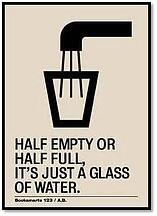
As a mother, I often tell my girls to always consider each side of a story and to be cautious about thinking that everyone understands things as they do. This lesson could certainly be used in the service industry. In all of our businesses, internally we "talk" a language that only "we" understand. It may be acronyms, certain words that have double meanings, numbers, etc. Several of my team members can speak an entire sentence using acronyms, and I would understand, but of course, our customers would not. An acronym that we use everyday is SPT, which we call "Spit" and is a very important database/program. Telling our customers that we "will check the 'Spit' to confirm their project status" would no doubt cause confusion.
“If one does not understand a person, one tends to regard him as a fool” ― C.G. Jung


 You need to set your goals and define your limits before the actual negotiation begins. After you know your goals and limits, you can decide on your opening offer. Your goals and limits carry you right to the end of the negotiation, enabling you to decide when to close a deal and when to walk away. The very process of setting limits gives you power in a negotiation, because the process forces you to focus on what else you will do if you fail to reach an agreement. I call that your or else.
You need to set your goals and define your limits before the actual negotiation begins. After you know your goals and limits, you can decide on your opening offer. Your goals and limits carry you right to the end of the negotiation, enabling you to decide when to close a deal and when to walk away. The very process of setting limits gives you power in a negotiation, because the process forces you to focus on what else you will do if you fail to reach an agreement. I call that your or else. I like to do this exercise with people starting a new business venture--it's a great way to troubleshoot any future problems. Basically, you're going to brainstorm potential mistakes you and/or your staff might make in the future. Be brutally honest: Where could you possibly screw up? What could go wrong if all hell broke loose? Then talk through how you would handle it. You are proactively avoiding these mistakes by anticipating them ahead of time. No one likes to imagine the "what-ifs," but it gives you greater piece of mind knowing you have a plan to handle them.
I like to do this exercise with people starting a new business venture--it's a great way to troubleshoot any future problems. Basically, you're going to brainstorm potential mistakes you and/or your staff might make in the future. Be brutally honest: Where could you possibly screw up? What could go wrong if all hell broke loose? Then talk through how you would handle it. You are proactively avoiding these mistakes by anticipating them ahead of time. No one likes to imagine the "what-ifs," but it gives you greater piece of mind knowing you have a plan to handle them. Once you have established specific goals, ongoing coaching is essential to developing your employees. Enterprise [the car rental company] uses a coaching method known as SOS, which stands for "show, observe, and shape."
Once you have established specific goals, ongoing coaching is essential to developing your employees. Enterprise [the car rental company] uses a coaching method known as SOS, which stands for "show, observe, and shape."  Without factual information and timely, candid feedback, teams quickly dissolve into weak, dependent groups, shifting responsibility and ownership for problems to those who are informed. In many organizations, this results in a crippling "dependency syndrome," an upward delegation of problem-solving and conflict resolution. Got a problem? Give it to the boss to solve!
Without factual information and timely, candid feedback, teams quickly dissolve into weak, dependent groups, shifting responsibility and ownership for problems to those who are informed. In many organizations, this results in a crippling "dependency syndrome," an upward delegation of problem-solving and conflict resolution. Got a problem? Give it to the boss to solve! People who handle stress well tend to employ what stress experts call an "optimistic explanatory style." They don't beat themselves up when things don't work out in their favor. So instead of using statements that catastrophize an incident, like "I'm a complete failure," they might say to themselves, "I need to work on my backhand."
People who handle stress well tend to employ what stress experts call an "optimistic explanatory style." They don't beat themselves up when things don't work out in their favor. So instead of using statements that catastrophize an incident, like "I'm a complete failure," they might say to themselves, "I need to work on my backhand."